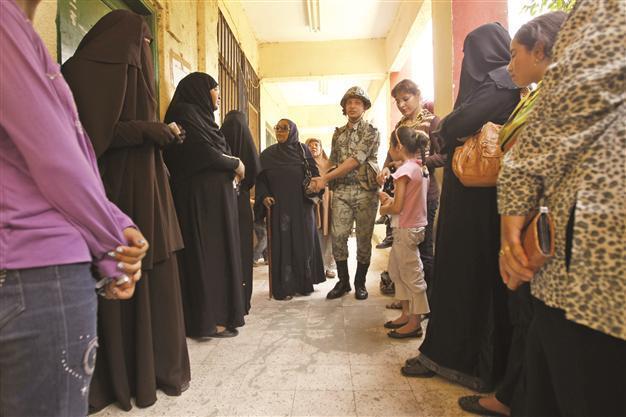Egypt waiting for Mubarak’s successor amid uncertainty
CAIRO

An Egyptian security force officers guides women at a polling station in Cairo. The race has polarized the nation, dividing
those who fear a return to the old regime under Shafiq from others who want to keep religion out of politics. AFP photo
Egyptians voted yesterday on the last day of a highly divisive presidential run-off between an Islamist and Hosni
Mubarak’s last prime minister, amid moves by the army to consolidate its power ahead of the final results.
Former air force chief Ahmed Shafiq, who served as ex-president Mubarak’s prime minister in the last days of the uprising that toppled him, is vying for the top job against Muslim Brotherhood candidate Mohammed Morsi.
The election comes against a backdrop of legal and political chaos, with the Muslim Brotherhood set on a confrontation path with the ruling military after it ordered the Islamist-led parliament dissolved. The move throws
Egypt’s already tumultuous transition after Mubarak’s ouster last year into further disarray with the new president expected to take office without a Parliament and without a constitution.
Army to oversee legislation and budgetThe ruling military council is to maintain control over legislation and the budget in the absence of a Parliament, even as the country prepares to announce a new president, military sources told Agence France-Presse.
Military sources said the ruling Supreme Council of the Armed Forces was set to issue an amended constitutional declaration. The sources say article 56 of the declaration will be amended to give legislative powers and state budget to the military, following a ruling by Egypt’s top court that the Islamist-led parliament is invalid. The army will also issue new rules under article 60 for the formation of the constituent assembly that is to draft the country’s permanent constitution.
The race has polarized the nation, dividing those who fear a return to the old regime under Shafiq from others who want to keep religion out of politics and fear the Brotherhood would stifle personal freedoms.
The new president will inherit a struggling economy, deteriorating security and the challenge of uniting a nation divided by the 18-day uprising that toppled Mubarak in February 2011.
